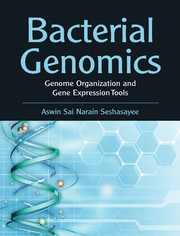Book contents
- Frontmatter
- Dedication
- Contents
- List of Figures
- Acknowledgements
- 1 Introduction: Bacterial Genomes and Gene Expression
- 2 Comparative Genomics in the Era of Sanger Sequencing
- 3 Studying Bacterial Genome Variation with Microarrays
- 4 Studying Bacterial Genomes using Next-Generation Sequencing
- 5 Genome-Scale Analysis of Gene Expression and its Regulation in Bacteria
- 6 DNA Methylation in Bacteria: A Case for Bacterial Epigenetics
- Index
6 - DNA Methylation in Bacteria: A Case for Bacterial Epigenetics
Published online by Cambridge University Press: 05 April 2015
- Frontmatter
- Dedication
- Contents
- List of Figures
- Acknowledgements
- 1 Introduction: Bacterial Genomes and Gene Expression
- 2 Comparative Genomics in the Era of Sanger Sequencing
- 3 Studying Bacterial Genome Variation with Microarrays
- 4 Studying Bacterial Genomes using Next-Generation Sequencing
- 5 Genome-Scale Analysis of Gene Expression and its Regulation in Bacteria
- 6 DNA Methylation in Bacteria: A Case for Bacterial Epigenetics
- Index
Summary
Introduction
In the previous chapters, we had discussed genome-scale studies of bacterial adaptation by genome content and gene expression control. In these mechanisms, there is either a change in the genotype of the bacterium; or there is a change in the protein occupancy of the genome, which is not necessarily heritable. A third mechanism of establishing identity–best studied in complex eukaryotes–is by epigenetics. The word essentially means ‘in addition to genes’. This, in the broadest sense used by biologists today, refers to–for example–changes in gene expression which are heritable, but do not include a change in genotype. These are in contrast to the phenomena discussed in the previous chapters: Comparative genomic approaches reveal changes in genetic content, whereas mechanisms of regulation of gene expression as discussed earlier are not necessarily heritable.
A classical epigenetic mechanism involves methylation of DNA–namely adenine and cytosine bases. Methylation of cytosine at what are known as CpG islands is a reasonably well-studied gene regulatory mechanism in higher eukaryotes. Phenomena such as the specificity of certain DNA methylating enzymes to hemi-methylated DNA, as well as the competition between DNA methylating enzymes and other DNA-binding proteins, ensure that certain–if not all–DNA methylation patterns are inherited. In bacteria, the interplay of DNA methylation and DNA-binding transcription factors can cause phase variation, with distinct sub-populations exhibiting heritably different gene expression states; this is distinct from the genetic mechanism of phase variation at contingency loci in the genomes of bacteria such as Helicobacter pylori, discussed earlier in this book. The current short chapter does not deal extensively with the intricate biology of bacterial DNA methylation and epigenetics; for this the readers are referred to authoritative recent reviews by Casadesus and colleagues. Instead, we briefly discuss the comparative genomics of enzymatic systems involved in DNA methylation and novel genome-scale approaches for detecting DNA methylation at a single-base resolution.
- Type
- Chapter
- Information
- Bacterial GenomicsGenome Organization and Gene Expression Tools, pp. 191 - 206Publisher: Cambridge University PressPrint publication year: 2015



